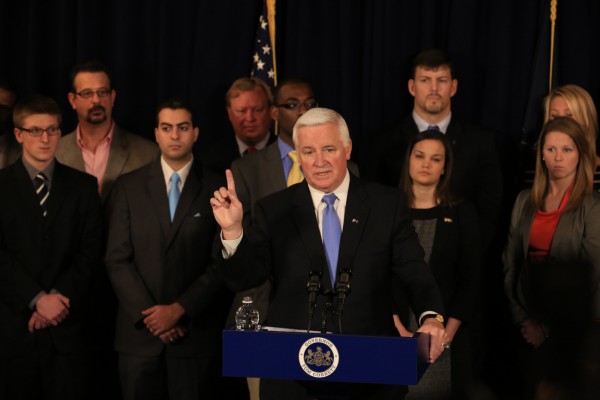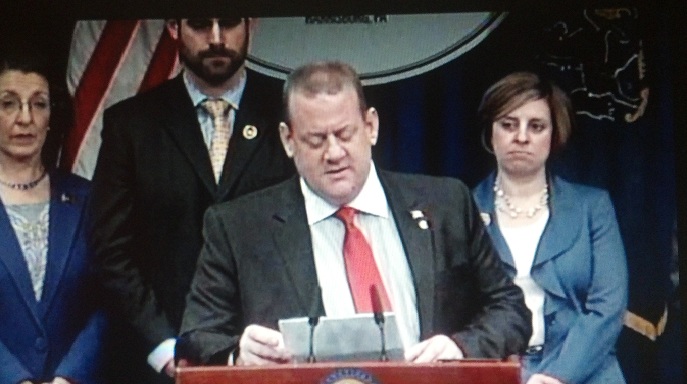Governor Tom Corbett on Having an Outside Firm Run the Pennsylvania Lottery
/in Ask the Governor, Media, News, Video /by PAMattersGovernor Tom Corbett on Liquor Privatization
/2 Comments/in Ask the Governor, Media, News, Video /by PAMattersGovernor Tom Corbett on the Budget and Pension Obligations
/in Ask the Governor, News, Video /by PAMattersHouse Majority Proposes Charter, Cyber Charter Funding Changes
/in News /by PAMattersThe cyber school funding formula is at the center of the latest charter school debate in Harrisburg. House Republicans unveiled a package of bills on Friday, which would allow school districts to make four additional deductions when calculating payments to cyber charter schools.
“Our children are being treated as second-class citizens in the education world, and it’s not fair,” says PA Families for Public Cyber Schools Executive Director Jenny Bradmon. On average, she says charter schools are already receiving just 70% of what it costs a school district to educate a child.
But state Rep. Mike Reese (R-Westmoreland/Fayette) says it’s not about picking winners and losers. “This is about making sure that there’s equitable funding for both brick-and-mortar public schools and our cyber schools in Pennsylvania,” he tells Radio PA.
“I believe cyber schools play a very important role in our education system, no doubt about that, but I think we have a responsibility to the taxpayers of Pennsylvania to make sure that their tax dollars are being spent wisely.”
Among other things, Reese’s legislation would allow school districts to deduct 50% of the cost of extra-curricular activities and 100% of the cost of things like student health, food and library services. These are costs borne by a district’s taxpayers, but services that are not necessarily offered by the cyber schools.
There are parts of the House GOP package that charter school advocates do support. For instance, one provision would call for the state to fund charters directly in order to ensure timely payments. Another would allow for longer charter terms, which would allow the schools to obtain better financing for their own capital projects.
But Pennsylvania Coalition of Public Charter Schools Executive Director Bob Fayfich says the so-called cyber funding reforms are arbitrary. “They’re based not on what the cost is for a high-quality cyber education… but rather an arbitrary percentage of costs associated with the expenses of the district.”
House Republicans call their bills a “starting point” for discussions with all interested parties.
The Pennsylvania School Boards Association (PSBA) and Pennsylvania State Education Association (PSEA) have each released statements referring to the Republican package as a positive step toward meaningful charter school reform.
More than 105,000 Pennsylvania students are currently enrolled in 157-charter schools and 16-cyber charter schools. The statewide average for non-special education charter school payments is just over $9,400 per student.
Corbett Confident in NCAA Lawsuit
/in News /by PAMattersResponding to a listener question on Radio PA’s Ask the Governor program, Tom Corbett expressed confidence that he will win the antitrust lawsuit he filed against the NCAA earlier this month. Governor Corbett is asking the federal courts to throw out the NCAA sanctions imposed on Penn State in the wake of the Jerry Sandusky scandal.
“The NCAA didn’t even follow their own rules. It seems to me they’re accusing Penn State of not following guidelines. There are no rules under which they were ever charged.”
Corbett calls the so-called loss of institutional control “vague” and “ambiguous.” In fact, pointing to an external investigation of the way the NCAA handled its investigation of the University of Miami, the governor suggests it has lost institutional control.
The sanctions included in the NCAA’s consent decree with Penn State are: a four-year postseason ban, a loss of scholarships, five years of probation, the vacation of all wins from 1998 – 2011 and a $60-million dollar fine.
Even if the sanctions are thrown out, Corbett says Penn State should honor the $60-million dollar fine. However, he believes that 100% of the money should stay within Pennsylvania borders to benefit programs that prevent child sex abuse and assist its victims. Under the consent decree, only 25% is guaranteed to stay in-state.
The NCAA has 60-days from the date of the lawsuit to file its response. The Commonwealth will then have 30-days to respond to the motions being made, so any action on the suit is still months away.
Treasurer Might Not Sign Off On Lottery Payments to Private Manager
/in News /by PAMattersThe State Attorney General is still reviewing a deal to give management of the Pennsylvania Lottery to a private firm. The state Treasurer is also doing his own review.
Treasurer Rob McCord says he’s still weighing whether his department will cut checks to the new lottery management firm even if Attorney General Kathleen Kane’s office clears the contract. McCord says his department plays a fiscal review role.
McCord is concerned about the expansion of lottery games without legislative approval in a contract with Camelot Global Services. He says he’s looking at it with increasing concern in deciding whether his office would distribute funds to Camelot.
Governor Corbett, appearing Friday on Radio PA’s “Ask the Governor” said there would be no reason for the Treasurer to withhold payments to the private manager. He adds he would have a long conversation with the treasurer about holding up due contracts if they’re approved by the attorney general.
The Governor, a Republican, indicated he was not concerned by the new Democratic Attorney General’s review of the agreement.
Radio PA Roundtable 01.25.13
/in Audio, Media, News, Radio PA Roundtable /by PAMattersOn this week’s Radio PA Roundtable, Brad Christman & Matt Paul have a preview of Governor Tom Corbett’s budget address, which is set for February 5th. Also, Franklin & Marshall College political science professor Terry Madonna looks ahead to President Obama’s 2nd term, and we’ll recap this week’s legislative hearing on the planned closure of two state prisons in western PA.
Radio PA Roundtable is a 30-minute program featuring in-depth reporting on the top news stories of the week.
Click the audio player below to hear the full broadcast:
[audio:https://s3.amazonaws.com/witfaudio/radiopa/Roundtable01-25-13.mp3]Anti-Bullying Legislation Would Provide for Clearer Definitions, Procedures
/in News /by PAMattersA state representative has reintroduced an anti-bullying measure called the PASS act. The bill is aimed at prevention and increasing the reporting of incidents.
Representative Dan Truitt’s (R-Chester) bill would require would require the state to develop a model policy to more clearly define bullying and what should be done in response. Schools could adopt that policy or formulate one of their own. The bill also calls for an on line reporting and tracking system to make sure bullying is addressed when it happens.
Truitt says the legislation seeks to ensure every public school teacher will know how to identify bullying and what to do about it. He says it does not create yet another unfunded mandate on struggling schools.
It’s estimated that 85% of bullying incidents nationwide go unreported. Jason Goodman, director of the youth-led Pennsylvania Student Equality Coalition, says the state’s anti-bullying law is inadequate and outdated.
Goodman says if students don’t feel safe in their classrooms, how can they learn? He says students who are harassed in school are more likely to drop out, skip school, develop anxiety and depression and consider self harm or suicide.
Tammy Simpson lost her 14-year-old son to suicide. He left a note saying he’d been harassed for 5 years and couldn’t take it anymore. She says she did not know her son was having issues. She says we need to put things in place to protect our kids.
Representative Jim Roebuck (D-Philadelphia), minority chair of the House Education Committee, called the issue a moral imperative and said there is an urgency involved in protecting students from bullying.
Merit Selection Would End Statewide Judicial Elections
/in News /by PAMattersThe latest push for the merit selection of Pennsylvania judges comes as suspended state Supreme Court Justice Joan Orie Melvin stands trial on a series of campaign corruption charges. “[Melvin’s trial] should be Exhibit A on why we need a system of choosing judges that doesn’t involve partisan campaign practices and judicial fundraising,” Pennsylvanians for Modern Courts Executive Director Lynn Marks tells Radio PA. “It’s a very timely illustration.”
Senator Anthony Williams, a Philadelphia Democrat, was introducing his latest merit selection bill just as the jurors were being picked for Melvin’s Allegheny County trial. “I’ve filed a merit selection bill under a Democratic governor and I’m filing one under a Republican one. This isn’t a matter of partisanship. It’s about ensuring integrity on the bench,” Williams said in a statement.
Under the merit selection bill, appellate court judges (Commonwealth, Superior, Supreme) would be nominated by the governor from a pool of candidates that have been pre-selected by an independent, bipartisan commission. The governor’s selection would then be subject to the Senate confirmation process.
“It doesn’t make sense to have people campaign in a totally partisan process, while at the same time they’re pledging to be non-partisan after Election Day,” says Marks.
While critics say this sort of reform plan is more ‘political appointment’ than merit selection, Marks stresses that it takes the money out of the process. She’s not naive enough to say it’s going to get rid of all the politics, but Marks calls merit selection a vast improvement over the current system.
Merit selection would require a constitutional amendment, which means Williams’ bill would need to pass the General Assembly in two consecutive sessions before it could be put to the voters for ratification.
Welcome to PAMatters.com, a new source for news and commentary from Pennsylvania’s capital. In addition to video, audio and pictures from the stories and events that affect YOU, you’ll also get some behind-the-scenes analysis via blogs from our award-winning staff of journalists.








